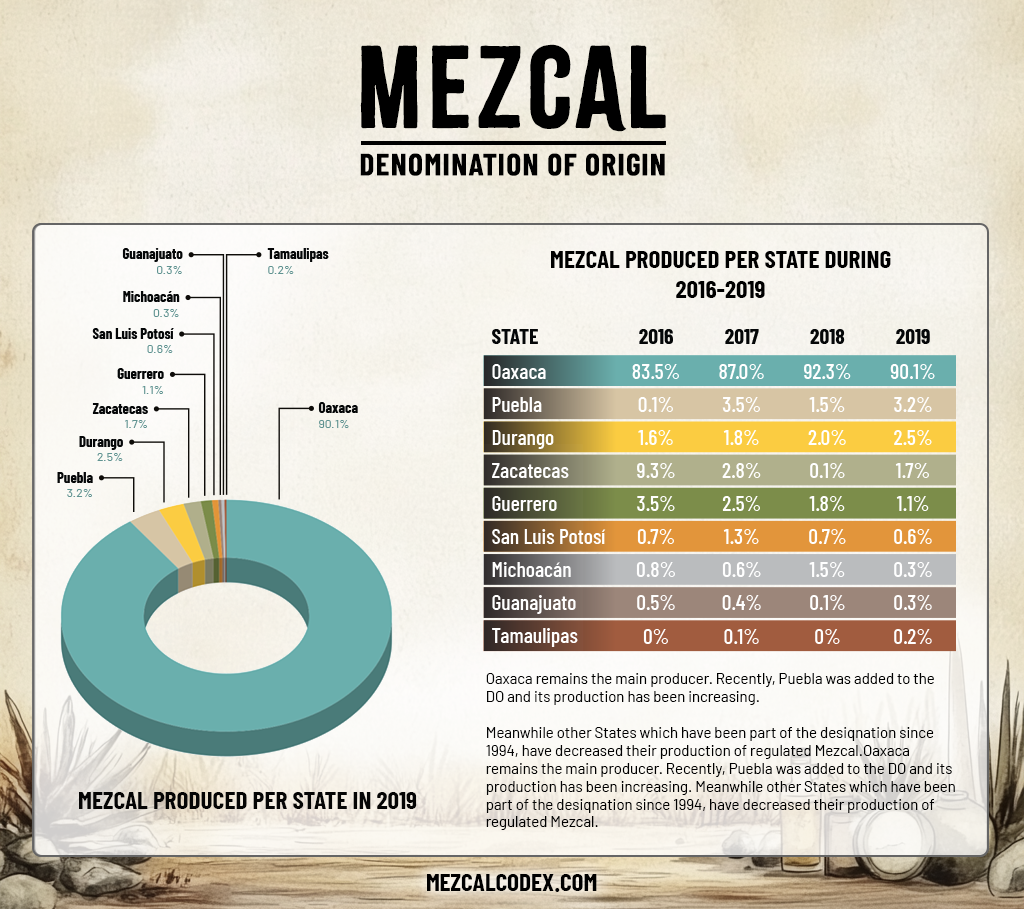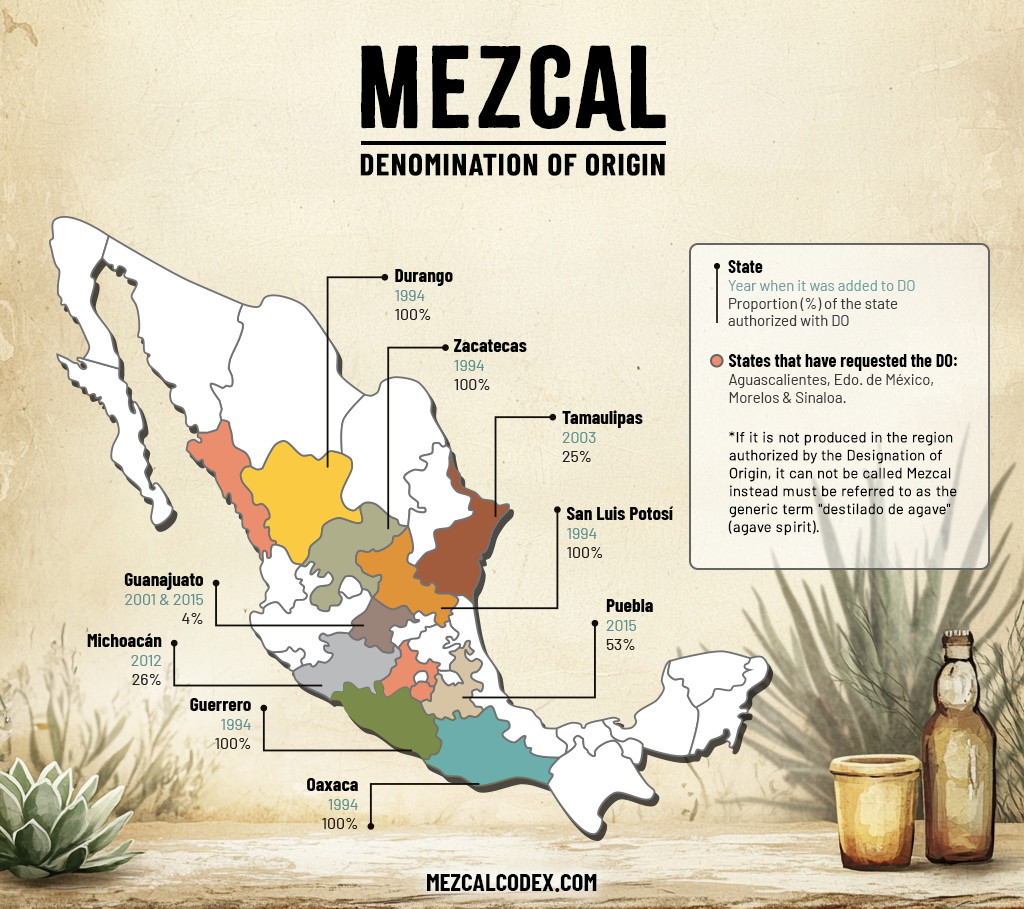denomination of origin
The Denomination of Origin (DO) for Mezcal serves as a vital certification that safeguards the authenticity of this renowned spirit, firmly linking it to its roots in specific regions of Mexico. This designation is not merely a label but a testament to the rich cultural heritage and history tied to the production of Mezcal, which artisans have crafted for generations. The DO ensures that the Mezcal produced adheres to traditional methods while highlighting the geographical uniqueness of the agave plants, making every bottle represent its environment.
What Does The Denomination of Origin Mean?
The DO plays a significant role in maintaining Mezcal’s quality and integrity. Establishing strict regulations on production processes and geographic boundaries guarantees that consumers receive a product that is genuine and reflective of the distinct flavors and characteristics inherent to its region of origin. This certification fosters an appreciation for the artistry and craftsmanship involved in mezcal production, promoting awareness and respect for the traditions that have shaped this beloved spirit. As Mezcal continues to gain popularity globally, the Denomination of Origin remains essential in preserving its authenticity and ensuring each sip tells a story steeped in culture and heritage.

Challenges and Controversies Surrounding DO
The Denomination of Origin is crucial in preserving Mezcal’s heritage by maintaining traditional production methods and regional specifications. However, this regulatory framework also presents challenges, such as restricting innovation and limiting access for smaller producers who might need help to meet stringent requirements.
These challenges may include:
- Accessibility for Small Producers: The certification process can be costly and complex, potentially excluding small-scale, traditional producers who may lack the resources to obtain certification.
- Debates on Inclusivity: There’s an ongoing discussion about the DO’s inclusivity, as some regions and producers feel marginalized or excluded from the designation, leading to tensions within the industry.
Addressing these issues is essential to ensure that the DO benefits all stakeholders and preserves the rich diversity of mezcal production.
Benefits of DO for Consumers
The Denomination of Origin ensures the protection of traditional production methods and cultural heritage, which can enhance the quality and uniqueness of products. Additionally, it helps consumers identify authentic products and supports local economies by promoting regional specialties.
For consumers, the DO offers several assurances:
- Authenticity: Ensures the Mezcal is genuinely from designated regions and produced using traditional methods.
- Quality: Adherence to specific standards guarantees a high-quality product.
- Cultural Preservation: Supports the continuation of traditional practices and the livelihoods of local communities.
By choosing DO-certified Mezcal, consumers can enjoy a product that embodies Mexico’s rich cultural heritage and artisanal craftsmanship.
The Denomination of Origin for Mezcal is a vital framework that safeguards the spirit’s authenticity, quality, and cultural significance. While it presents particular challenges, its role in preserving Mezcal’s heritage and ensuring consumer trust is indispensable.
Geographical Boundaries
Mezcal’s DO encompasses several Mexican states, each contributing unique environmental factors influencing the spirit’s flavor profile.
The primary states include:

- Oaxaca: Oaxaca, often considered the heart of mezcal production, is renowned for its diverse climate and rich soil. These conditions allow various agave species to thrive, resulting in mezcals characterized by their deep, complex flavors and traditional production techniques.
- Guerrero: Guerrero is celebrated for its rugged terrain and volcanic soil, which contribute to the distinctive minerality and earthy notes found in its Mezcal, often produced using traditional methods reflecting the region’s rich cultural heritage.
- Durango: Durango is known for its high-altitude agave farms, where the unique climate and diverse ecosystems produce mezcals with vibrant floral and herbal notes. These mezcals showcase the state’s commitment to traditional distillation practices.
- San Luis Potosí: San Luis Potosí is distinguished by its lush landscapes and varied microclimates, which enable the cultivation of unique agave varieties. These agave varieties result in mezcals that often balance sweetness and earthy undertones, reflecting the region’s artisanal traditions.
- Puebla: Puebla is recognized for its unique production techniques and the use of local agave species, which contribute to mezcals that often feature a smooth, nuanced profile with hints of citrus and spice, embodying both the region’s heritage and its innovative spirit.
- Zacatecas: Zacatecas is known for its arid climate and diverse agave varieties, leading to mezcals often characterized by bold, earthy flavors and a robust finish, reflecting the region’s deep-rooted mezcal-making traditions.
- Michoacán: Michoacán is celebrated for its rich biodiversity and high-quality agave plants, which yield mezcals that exhibit complex flavor profiles with notes of stone fruit and smoke, highlighting the region’s commitment to traditional artisanal production methods.
- Guanajuato: Guanajuato is noted for its high-altitude agave cultivation, where the distinct climatic conditions create mezcals with bright, citrus-forward flavors and a lighter body. These mezcals showcase the region’s innovative approach to traditional distillation techniques.
- Tamaulipas: Tamaulipas is recognized for its diverse ecosystems and rich agricultural practices, resulting in mezcals that often feature a harmonious blend of herbal and fruity notes, reflecting the region’s unique geographical influences and commitment to traditional craftsmanship.
Each region’s unique climate, soil, and agave species contribute to the Mezcal’s distinct characteristics.
Traditional Production Methods
The DO mandates adherence to traditional mezcal production techniques, ensuring that the spirit’s rich heritage and authenticity are preserved. These techniques encompass various artisanal practices, from the selection of agave plants to the meticulous distillation process, reflecting the deep cultural significance of Mezcal in its regions of origin.
- Cooking: Roasting agave hearts (piñas) in earthen pits to impart a smoky flavor.
- Milling: Crushing the cooked agave using a stone wheel, often pulled by animals or hand.
- Fermentation: Allowing natural fermentation in wooden vats or animal hides.
- Distillation: Utilizing clay or copper stills, depending on the mezcal category.
These artisanal methods are integral to the Mezcal’s identity and are protected under the DO to maintain the spirit’s traditional essence.


Ensuring Mezcal is Here to Stay!
The Denomination of Origin is instrumental in ensuring that Mezcal remains vital to Mexico’s cultural landscape and the global spirits market. By establishing clear regulations around production methods and geographic boundaries, the DO protects traditional practices and fosters sustainability in mezcal production. This framework encourages artisans and small-scale producers to maintain their heritage while adapting to modern market demands, ensuring their craft remains viable for future generations.
Recognizing the DO elevates Mezcal’s status, allowing it to gain a foothold in the premium spirits segment. As awareness and appreciation for Mezcal grow worldwide, the DO is a guardian of authenticity, reinforcing its place in local communities and international markets, thus helping ensure that Mezcal stays for us all to enjoy!